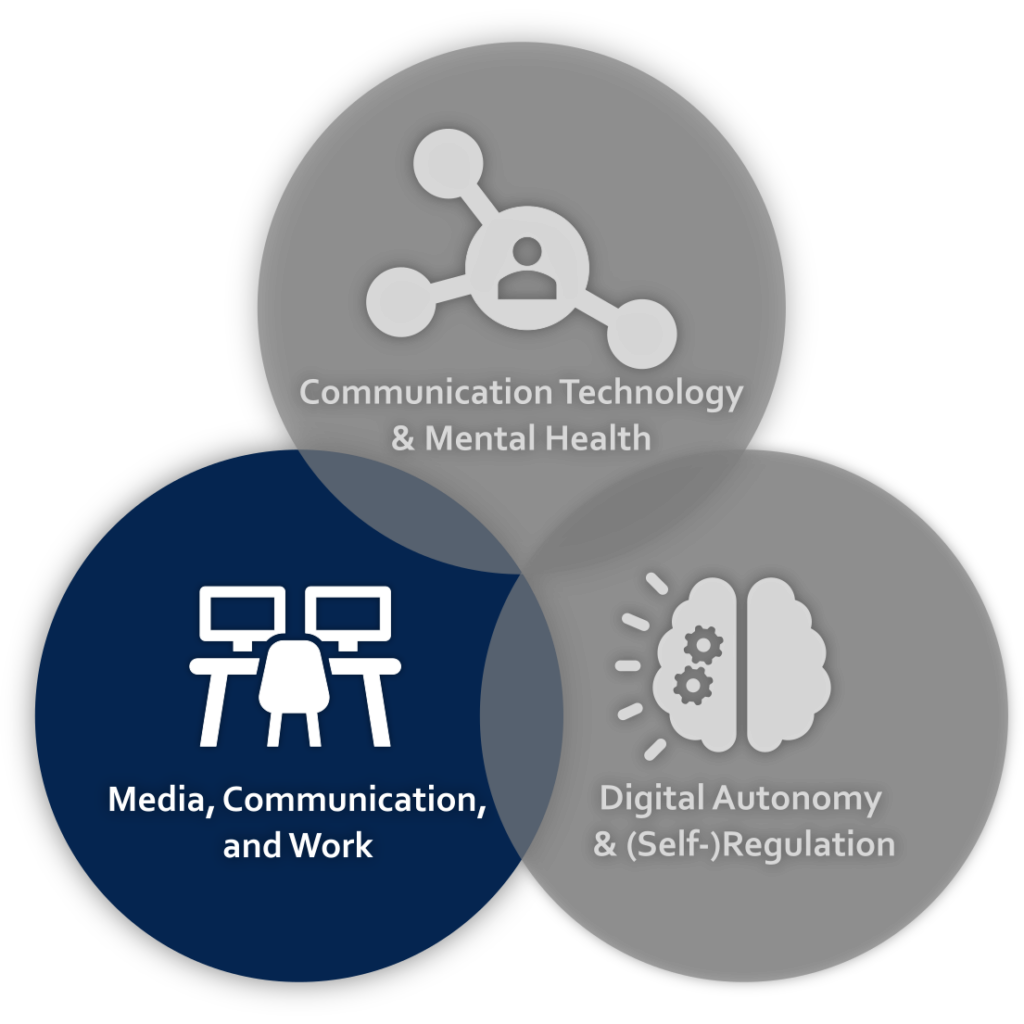Media, Communication, and Work
The research focus Media, Communication, and Work focuses on the role of media and communication in the increasingly digital world of work and for the future of work. The aim of this focus area, which is currently being established at FAU, is to transfer the theoretical, methodological and empirical findings from the first two research areas of the professorship to the context of the world of work and to expand them to include organizational perspectives. As a member of the Institute for Labor Market and Socioeconomics at the School of Business, Economics and Society, a central focus of our research is on the interplay between changes in the world of work, digital communication and media use practices in the work-home interface, and central indicators of a good life (e.g. life satisfaction, job satisfaction, emotional and social well-being).

The following research strands and projects characterize this research area:
A first line of research examines the causes and boundary conditions for digital stress, in particular due to the norm of constant availability and through the concept of online vigilance (e.g. sustained mental preoccupation with work-related digital communication). Digital stress and technostress are well-documented phenomena in the world of work. In addition to phenomena such as multitasking and “communication overload” or “information overload”, the cognitive internalization (so-called salience) of accessibility norms plays an important but as yet little understood role.
Building on this, a second line of research investigates increasingly prevalent phenomena of digital disconnection, i.e. the temporary disconnection from digital media and communication technologies (also known as “digital detox”), e.g. to be able to concentrate better on work or to be more present in the moment. We are investigating the motives, (non-)usage patterns and effectiveness of disconnection in learning and working environments. In terms of labor law, this phenomenon is also highly relevant in view of a “right to disconnect” that is increasingly being established in European countries.
A third long-standing strand of research examines procrastination through media use, i.e. how and why digital media are used to postpone work, particularly at the interface between work and leisure. Digital media are often seen as instruments and causes of procrastination of important tasks. The design and usage habits of digital media appear to play a central role in this. Our research investigates media-induced procrastination in the context of learning behavior among students and young people and with regard to private media use during work, e.g., when working from home. In addition to experience sampling and diary methods, we also use digital behavioral data (e.g. smartphone log data) in this line or research.
Selected publications in this research area:
- Klingelhoefer, J., & Meier, A. (2023). Social media and well-being at work, at home, and in-between: a review. In J. Skopek (Eds.), Research handbook on digital sociology. (pp. 398–418). Edward Elgar.
- Freytag, A., Knop-Huelss, K., Meier, A., Reinecke, L., Hefner, D., Klimmt, C., & Vorderer, P. (2021). Permanently online—always stressed out? The effects of permanent connectedness on stress experiences. Human Communication Research, 47(2), 132-165. https://doi.org/10.1093/hcr/hqaa014
- Johannes, N., Meier, A., Reinecke, L., Ehlert, S., Setiawan, D.N., Walasek, N.,... Veling, H. (2021). The relationship between online vigilance and affective well-being in everyday life: Combining smartphone logging with experience sampling. Media Psychology, 24(5), 581-605. https://doi.org/10.1080/15213269.2020.1768122
All publications of the Chair can be found here.
